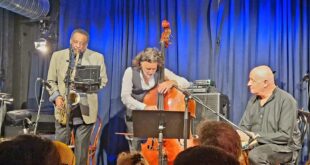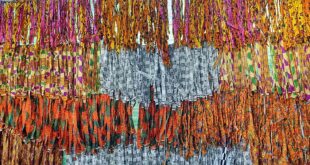The maltreatment of African residents in the southern Chinese city of Guangzhou last week is poisoning popular attitude to the Chinese not only across Africa, but also in the global African diaspora. Even though Beijing has denied any racism in the coronavirus-related incident and has pledged to improve its treatment of Africans in the country, the anger of Africans is still seething, with many calling for sanctions, including economic boycott of China. Femi Akomolafe, book author and newspaper columnist living in the Netherlands and Ghana, takes another view of the incident and he calls on Africans to deploy strategies instead of emotions in their reaction to the incident.
—-
“The truth is not always beautiful, nor beautiful words the truth.” ― Lao Tzu
“Men who wish to know about the world must learn about it in its particular details.” ― Heraclitus
Simply by observing nature, our Ancestors, like many old traditionalists, deduced the unity that is firmly embedded in nature. Examples abound wherever we choose to look: Hot is balanced by the cold. Day turns into Night. Male and Female. Visible versus invisible. Wet and Dry. Essence and Existence. Dark and Bright. Negative and Positive. etc, etc.
Through observation, our ancestors understood that the vast Cosmos is governed by a complementing principle of immutable duality.
From this, they further deduced that even the worst catastrophes bring forth profound opportunities and limitless possibilities.
The Yoruba people associate Ejiwapo (twoness) with a balancing force which they expect to have an influence on the cosmic order. Hence, their veneration of Ibeji (twins) whom they, with the Hunchback and the Albino, are considered emissaries of Olodumare (the Supreme Yoruba god).
In the Yoruba interpretation of the Cosmos, Tako Tabo (male and female) means that everything in nature must have an opposite. It is, thus, inconceivable in the Yoruba cosmogony for a half to exist in, and of, itself without its complementing half.
The Chinese call it Yin and Yang. Some philosophers grandiloquently call it Dialectical monism or dualistic monism or eschatological dualism; they all mean the same thing.
A few rather well-meaning Africans, aggrieved and offended by the treatment of some Africans in China, are calling for the expulsion of Chinese from Africa, and the boycott of Chinese goods.
I understand the anger, but I think that the calls are not only myopic, but they are also premised on emotional outbursts that are totally devoid of any strategic depth. They appear to be the deployment of emotions when what is called for are strategic responses that are borne out of deep introspections and high-quality considerations.
The Yorubas have a proverb: Ti a ba nsokun, a ma riran / Crying should not stop us from seeing.
Lao Tzu put it this way: “New beginnings are often disguised as painful endings.”
Our present anguish should not make us blind to our present objective reality, which is that we are so terribly behind the rest of humanity that absolutely no one reckons with us in geostrategic considerations.
Africa counts for little or nothing in the global scheme of things. Painful, but that’s the sad truth.
Rather than go into nasty funks, we should wake up and recognise that the world is one large classroom and that the best we can, and should, do for ourselves is to try and learn from wherever we can, in order to get the best advantages that will aid our yearned-for rediscovery, renaissance and development.
Luckily, there’s no need or reason for us to reinvent the wheel.
We might not like it, but the sad reality is that we live in a world where we have two MASTERS from whom to learn, copy or steal:
1. The European – they have misled us for about 600 years if the truth be told;
2. The Chinese – the new Sheriff in town.
Before we can get anywhere, it is vitally necessary for us to realize an important lesson: the world is not ruled by emotions, but by cold facts.
As the great leader and teacher, Marcus Garvey, said: “The whole world is run on a bluff.”
A very cold fact that we can ignore only at our peril is that the Chinese did not have it easy.
The Chinese simply followed the admonition of one of their greatest teachers, Lao Tzu: “Life is a series of natural and spontaneous changes. Don’t resist them – that only creates sorrow. Let reality be reality. Let things flow naturally forward in whatever way they like.”
My late mother put it this way: “What cannot be avoided must be endured, as what doesn’t kill you will only make you stronger.”
Even a cursory glance at modern Chinese history will show that they are a people that suffered enormously and paid huge prices to get to where they are today.
No, their successes did not come cheap and they were certainly not given to them on a platter.
The Chinese were beaten by a parade of colonialists. They stoically accepted their humiliation for centuries. They knew that there was nothing personal in their defeat and occupation; they were simply overwhelmed by people with superior technical knowledge and means. Their conquerors were simply obeying the evolutionary imperatives of consuming weaker species in order to stay alive.
The Chinese recognized their inferiority, but rather than to sulk and whine, they worked assiduously towards fixing it. They patiently took their time to learn. It took them a great time and many sacrifices, but they emerged much more powerful than their all tormentors combined.
Today, the Chinese are Masters of all that they survey. The world combined together cannot confront the Chinese Behemoth. Were it to be in their nature, there is no force on earth today to stop them from becoming a Hegemon if they so desire.
What the Chinese did not forget was that they were a people with a history, 5,000 years of it. They saw the defeats and occupation by foreign forces as accidental interregnums which can be mastered and conquered. They reached for strength from their sages – Confucius, Lao Tzu, and others.
The emergence of China as a Great Power teaches incredibly valuable lessons to those of us in Africa. The main question we face is: are we prepared to be good students and learn, or are we going to remain Eternal Whiners?
Huffing and puffing and beating of chests are good for venting our impotent rage and anger, but how will they help us?
Let’s listen to Tzu Lao: “For the wise man looks into space and he knows there are no limited dimensions.”
Whichever way we throw it around, we remain a CONQUERED and OPPRESSED PEOPLE.
Despite all the fanciful appurtenances we display as emblems of sovereignty, we are mere colonial appendages of the Metropolitan Powers.
I am not trying to distress anyone; these are just cold facts.
The important and urgent thing for us to do is to accept our sad fate and work towards redeeming ourselves.
We should not fool ourselves into believing that the world will pay any heed to our empty sloganeering. We are just too inconsequential in the global scheme of things to make our anger count for anything.
It is sad, but we are not only powerless, but our voices also count for zilch.
Continuing to deploy impotent rage might make us feel good and may satisfy our constituency, but they are not the antidotes to what currently ails us.
Let’s leave the sloganeering and empty rhetoric alone and begin to deploy our brains into generating useful ideas.
COVID-19 has revealed to the whole world the decrepit state of our structures and infrastructures. It has enabled the whole world to see what our misrulers plus their friends in the media and academia have been hiding with empty bombast – an Africa that cannot feed, house, and clothe herself without foreign assistance.
Let me end with this Yoruba proverb: A kì í fi iná sí orí òrùlé sùn. / No one goes to sleep with the roof of his house on fire. [A serious issue requires prompt attention; a stitch in time saves nine.]
Are we going to seize the opportunity and engage our brains in serious national-building efforts, or are we going to pretend that all is well, and continue to revel and dance to our self-generated lullabies?
The choice is clearly ours.
Since one of life’s lessons that I took to heart was my late mother’s admonition (mentioned Supra): “Whatever doesn’t kill you should make you stronger”, I urge that we seize the opportunity!
“There is no force like success, and that is why the individual makes all effort to surround himself throughout life with the evidence of it; as of the individual, so should it be of the nation.” – Marcus Garvey
Let’s all put the thinking caps on and begin to generate ideas. Thank you very much.
—
Femi Akomolafe is a passionate pan-Africanist. A columnist for the Accra-based Daily Dispatch newspaper and ModernGhana, and correspondent for the New African magazine, Femi lives in both Europe and Africa and writes regularly on Africa-related issues for various newspapers and magazines.
He is the author of Africa: Destroyed by the gods, Africa: It shall be well, 18 African Fables & Moonlight Stories and Ghana: Basic Facts + More
 THE AFRICAN COURIER. Reporting Africa and its Diaspora! The African Courier is an international magazine published in Germany to report on Africa and the Diaspora African experience. The first issue of the bimonthly magazine appeared on the newsstands on 15 February 1998. The African Courier is a communication forum for European-African political, economic and cultural exchanges, and a voice for Africa in Europe.
THE AFRICAN COURIER. Reporting Africa and its Diaspora! The African Courier is an international magazine published in Germany to report on Africa and the Diaspora African experience. The first issue of the bimonthly magazine appeared on the newsstands on 15 February 1998. The African Courier is a communication forum for European-African political, economic and cultural exchanges, and a voice for Africa in Europe.















